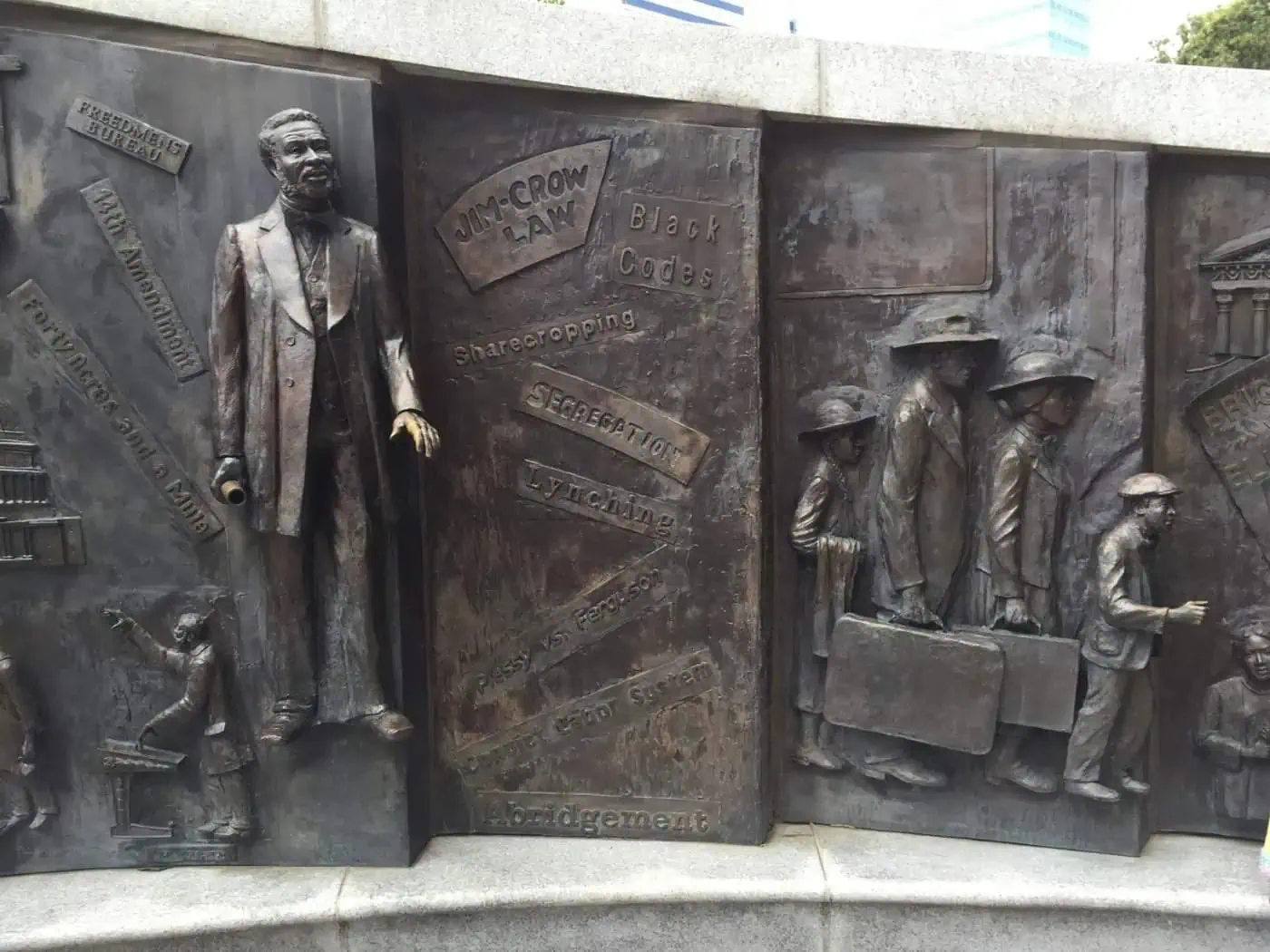Welcome to a journey through African American history. This guide is designed for those first to understand African Americans’ profound impact on the nation’s history, culture, and society. Whether you’re a student, a job seeker, or just curious, you’ll find insights into African Americans’ struggles, triumphs, and enduring spirit.
This guide will explore key events, figures, and movements that have shaped African American history from its earliest days. Our aim is not only to educate but to inspire. We can all contribute to a more inclusive and equitable future by recognizing and appreciating this rich history.
So, let’s start this important journey together. As you explore, remember that history is not just about the past. It’s about understanding our present and shaping our future. With that in mind, we invite you to learn about African American history and become a part of its ongoing narrative.
The Journey Begins: African American History Overview
The story of African Americans is integral to the fabric of American history. It started in the mid-1500s when Europeans brought black Africans to America as enslaved people—this period marked the beginning of a long history of struggle and endurance.
Despite the harsh circumstances, African Americans have always shown remarkable resilience. They were forced from their homes and subjected to unimaginable hardships. Yet, they helped to build the nation in invaluable ways. Here are some key points about these early days:
- Slavery wasn’t new to the world but took on a brutal form in America.
- African captives faced deadly conditions even before reaching American shores.
- Upon arrival, they were sold into slavery, primarily for work on plantations.
These beginnings underscore the complex journey of African Americans, from forced migration to laying the groundwork for future generations.
As you explore the impact of abolitionism in African American history, remember these origins. They set the stage for the many stages of progress and struggle.
To deepen your understanding of this period, consider exploring educational resources. Institutions like the National Museum of African American History and Culture offer extensive insights into early African American history.
The Harsh Reality of Slavery in America
Slavery cast a long, dark shadow over American history. African Americans, ripped from their homes, faced brutal conditions in America. This era is crucial in understanding African American history.
Life Under Slavery
Life for enslaved people was unimaginably complex. They worked long hours on plantations under cruel overseers. Yet, they fostered a resilient spirit and a strong sense of community. Here’s what life looked like:
- Endless work from dawn till dusk.
- Little to no freedom for personal life or movement.
- The development of rich cultural traditions despite restrictions.
Their strength in such hardship is a testament to the human spirit.
The Cultural Impact
African Americans created a rich cultural fabric that has influenced American culture profoundly. They:
- They developed their forms of worship and music, like spirituals.
- Kept family traditions alive as much as possible.
This cultural heritage continues to enrich American life. The stories, music, and traditions developed during this period are crucial to the overview of African American history.
Learning about slavery isn’t just about understanding the oppression faced by African Americans. It’s also about recognizing their incredible resilience and the ways they shaped the culture and history of the United States.
The Fight for Freedom: Abolition and the Civil War
The fight against slavery grew more robust over time. Many brave souls stood up for justice, demanding an end to slavery. This period was pivotal in African American history.
The Rise of Abolitionism
By the 1800s, more people joined the call to abolish slavery. Here’s how they made a difference:
- They wrote articles and books exposing the cruelty of slavery.
- Some formed groups to help escapees through the Underground Railroad.
Abolitionists came from all walks of life. Together, they set the stage for change.
The Civil War
Eventually, the nation couldn’t ignore the issue of slavery. The Civil War broke out, centering on this issue. Here’s what happened:
- African Americans fought bravely for their freedom and the Union.
- The war ended slavery but started a long journey toward true equality.
Many African Americans, both freed and enslaved, fought courageously. Their efforts were crucial to the Union’s victory.
After the war, the struggle continued. But during this period, she laid the groundwork for future progress in African American history. The abolishment of slavery was a crucial moment in African American history milestones.
Understanding this era sheds light on the bravery and resilience that have always been part of the African American experience.
Rebuilding Lives: Reconstruction and Jim Crow Era
After the Civil War, America entered the Reconstruction era. This period held hope for African Americans. Unfortunately, it was followed by the Jim Crow laws that enforced racial segregation.
The Reconstruction Era
During Reconstruction, African Americans made significant gains:
- They earned legal rights and even held political office.
- Despite these advances, their journey was far from easy.
The withdrawal of federal troops allowed old power structures to regain control. Thus, the progress made was undercut.
The Jim Crow Era
Next came the Jim Crow era, which imposed severe restrictions on African Americans:
- Segregation laws affected every part of life.
- Voting became almost impossible for many African Americans.
This era was marked by oppression but also by resilience. African Americans kept fighting for equality.
The Reconstruction and Jim Crow eras are critical to understanding the history of the American Civil Rights Movement. These times show the struggle but also the unbreakable spirit of the African American community.
The Great Migration: Seeking Better Opportunities
In the early 20th century, many African Americans moved North. They were seeking better lives and jobs. This mass movement is known as the Great Migration.
Escape from the South
The South’s oppressive laws pushed African Americans to leave. They hoped for more in the North. Here’s what drove them:
- They sought freedom from Jim Crow laws.
- Industrial jobs in the North promised better wages.
Despite these hopes, the North had its challenges.
New Challenges and Opportunities
The North wasn’t the promised land they expected. Yet, it offered new chances:
- Cultural movements, like the Harlem Renaissance, flourished.
- African Americans began to build influential communities.
This migration shaped new African American identities. It also had a lasting impact on American society. For more details, referencing the historical context becomes essential.
The Great Migration is a critical episode in our overview of African American history. It represents a turning point, introducing new challenges and opening doors of opportunity.
A New Dawn: Civil Rights Movement History
The Civil Rights Movement was a pivotal time in African American history. It marked a new era of fight against racial discrimination.
The Fight for Equality
This movement brought people together. They demanded change, which led to:
- Boycotts and peaceful protests that made headlines.
- Legal victories that ended segregation and secured voting rights.
Civil rights leaders like Martin Luther King Jr. and Rosa Parks became icons of courage.
Lasting Impact
The movement’s success brought about significant changes:
- New laws guaranteed civil rights for all Americans.
- It inspired other movements around the world.
The legacy of this era continues to influence society. It’s a testament to the power of collective action and moral courage.
Resources like the National Civil Rights Museum offer comprehensive insights into the Civil Rights Movement’s history for those looking to delve deeper into the topic.
Continuing the Legacy: Modern Achievements and Struggles
Today, African Americans continue to shape all aspects of American society. Both achievements and ongoing challenges mark their journey.
Achievements Across Fields
African Americans have excelled in many areas, such as:
- Politics, with leaders paving the way for future generations.
- Science and technology are breaking new ground.
- Arts and entertainment, influencing global culture.
These successes have inspired many and changed the world.
Tackling Today’s Challenges
Despite progress, challenges remain:
- Racial inequality persists in various forms.
- The fight for justice and equality continues in the courts and communities.
Yet, the spirit of resilience and the desire for a better future are more vital than ever.
This ongoing journey contributes to the rich tapestry of the overview of African American history. Efforts to preserve and share this history are crucial for future generations to understand and appreciate the contributions and sacrifices of African Americans.
FAQs on African American History
Many have questions about the overview of African American history. Here are answers to some common ones.
Who were the key leaders in the Civil Rights Movement?
Leaders like Martin Luther King Jr., Rosa Parks, and Malcolm X were pivotal. Their courage changed history.
How did abolitionism impact African American history?
Abolitionists fought to end slavery, setting the stage for freedom and equality.
What was the Great Migration?
It was a mass movement of African Americans to the North for better opportunities.
How do modern struggles compare to past ones?
Today, challenges persist, but the fight for justice continues. The past teaches resilience and hope.
Understanding these aspects is critical to grasping the overview of African American history. It shows the journey’s complexity and the ongoing fight for equality.
What is the significance of Juneteenth?
Juneteenth marks the day when the last enslaved people in the U.S. learned of their freedom in 1865.
Can you explain the Jim Crow laws?
Jim Crow laws enforced racial segregation in the South from the late 19th century until the civil rights movement.
What role did music play in African American history?
Music, especially spirituals and jazz, was a form of resistance and expression during hardship and celebration.
How can I learn more about African American history?
Visiting museums, reading books by African American authors, and exploring credible websites are great ways to learn more.
These FAQs offer a glimpse into the complexities of African American history. They invite us to explore deeper and understand better.
Conclusion
The journey of African Americans is a testament to resilience, courage, and the continuous fight for justice and equality. From the early days of slavery to the modern achievements and struggles, African American history is an essential part of the American narrative. This overview aims to reflect on the past, understand the present, and inspire a better future.
Understanding this history is critical to fostering a more inclusive and diverse society. It invites us to reflect on our shared humanity and the strength of embracing our differences. As part of this ongoing journey, joining communities prioritizing diversity and inclusion is crucial.
We encourage you to join Diversity Employment. It’s where we celebrate diversity, advocate for equality, and continue to write history together. By becoming a part of our community, you contribute to a future where everyone’s history and contributions are acknowledged, respected, and celebrated.




